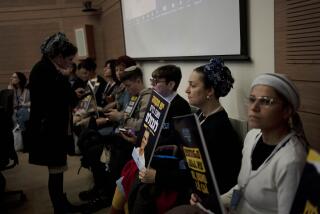Freed Indian Air Hostage Fears Copycats
- Share via
Jeanne Moore, the Bakersfield teacher who endured eight days as a hostage aboard a hijacked Indian Air jetliner, said she feared for her life “constantly,” but does not intend to let the ordeal dampen her adventurous spirit or her zest for life.
Moore, 53, said she is extremely grateful to be alive and back with her family, but she fears terrorist groups around the world may be emboldened by the success of the Islamic extremists.
“I’m glad it ended with a whimper and not with a bang,” Moore said, tightly clutching her two daughters’ hands. “I’m really glad it was me and not my family members” on the plane.
Moore, who arrived home Tuesday, was the only American among 155 people taken hostage when five terrorists seized a jetliner Christmas Eve after it had taken off from Nepal.
The hijackers originally demanded $200 million and the release of 36 jailed guerrillas. In the end, after killing one hostage, they freed the rest New Year’s Eve and rode off in a jeep after the Indian government released two Islamic militants and a Muslim cleric.
Moore, an avid traveler, said the first unusual sign on the flight from Nepal to New Delhi had been “men standing with grenades and guns.”
The passengers were ordered to put their heads down, and their plane began a wild journey across the Middle East and south Asia. Moore said she counted six takeoffs and landings before the plane finally came to rest in Afghanistan.
At one point, Moore, said, the passengers believed the plane was actually taxiing through a residential neighborhood.
In her first public comments, at KCET-TV Channel 28 studios in Hollywood, Moore crumpled into tears only once, when she described another passenger’s agonizing decision to put one of her children off the plane and remain on board with the other.
The hijackers allowed some elderly and small children to leave, she said, but gave them little time.
“She couldn’t hold both kids,” said Moore, her voice breaking as she described her friend’s predicament. “She just tossed the baby out the door” into waiting arms.
Moore said she has since learned that mother and child were reunited.
Once the plane arrived in Afghanistan, Moore said, the “manipulation” and “mind control” began.
Conditions on the plane were terrible, she said.
“I hope you don’t get a sense of what it was like,” she responded when asked to describe the experience. “It was a bad situation.” The stench from the bathroom, Moore said, quickly became sickening.
At one point, she became airsick and had to be escorted to the bathroom by the terrorists, who then forced her to drink a strange liquid.
Moore, who emerged from the plane in a wheelchair, said she is suffering from pneumonia. “I’m not as sick as I was and not as strong as I would like to be,” she said.
The terrorists, whom Moore and fellow passengers referred to as “our hosts,” played with the temperature on the plane, alternating intense heat with blasts of cold air. Meals sometimes were generous; other times food was denied.
The hijackers kept passengers guessing, Moore said. Many times, the hostages anticipated freedom, only to be confronted with screams and guns in their faces. She said she still does not completely understand what cause the hijackers were fighting for.
While the hijackers intimidated passengers to discourage escape attempts, she said, they also wanted to win their support. Many were nice to her, but she once was struck in the head for flicking a bug off her arm.
The terrorists also could be quite entertaining, she said.
They told jokes, passed around a megaphone so passengers could do the same, and encouraged people to pray with them.
Many also asked the passengers how they were.
“We would say ‘Very well, thank you,’ ” she said.
“They knew what they were doing,” she said. Three of them had some knowledge of English, and one of them spoke the language very well, she said.
But none of the terrorists ever translated their jokes or stand-up routines into English.
On the fifth day, Moore said, she was terrified when they asked her how to spell the word for coffin. Apparently, however, they needed the spelling for a note they were writing.
Moore, a child and family therapist, said she tried to help her fellow passengers, particularly a family with an autistic son she had met in the Nepal airport, but that “everyone had to take care of their own spirits.”
All the passengers have their own stories of triumphs and coping, she said.
Her own came when she was able to secure bananas for everyone on the plane. After she told a hijacker bananas would be nice, he brought her some. She told him everyone could benefit from the potassium, and soon, enough arrived for the whole plane.
Many passengers coped with the experience by sleeping “quite a lot,” but Moore said she tried to sleep only a few hours a night “so I wouldn’t miss anything.”
Moore grew up in Burbank, became a schoolteacher and has taught and lived in the Bakersfield area for the last 25 years. She’s divorced and has three adult children, including a son who is a Bakersfield police officer.
Moore, who began traveling widely after she survived cancer five years ago, said she does not intend to let this experience ground her.
She will return to India, she said.
But not, added her daughter Michelle Twisslemann, during Christmas.
More to Read
Sign up for Essential California
The most important California stories and recommendations in your inbox every morning.
You may occasionally receive promotional content from the Los Angeles Times.













